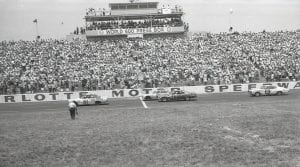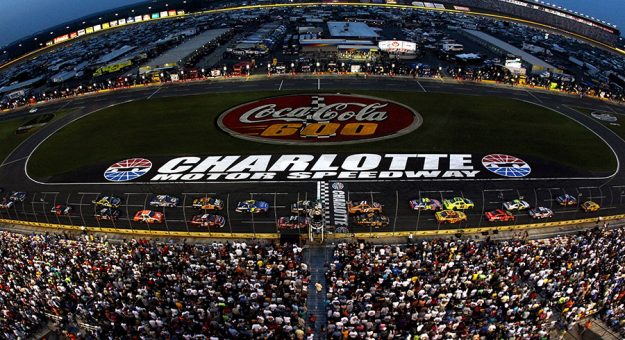The annual Coca-Cola 600 at Charlotte Motor Speedway has been the most grueling race on the NASCAR Cup Series schedule for more than 60 years.
Six-hundred miles, 400 laps around the 1.5-mile track tests the skill and determination of the very best drivers throughout the longest race of the season. A brief look back at the facility’s history helps to set the stage of how the iconic track and its signature race length came into existence.
The track’s founder, O. Bruton Smith, and NASCAR star Curtis Turner joined forces in 1959 after entertaining visions of building separate race tracks. Challenges over the next year threatened to end their dream in a pile of unpaid bills and lawsuits.
The initial target for opening the track was May 20, 1960. Unforeseen problems such as the removal of 500,000 cubic yards of rock, two snowstorms and ever-present financial problems pushed the inaugural World 600 to June 19, 1960.
Paving was completed the day of opening practice, leaving no time for the asphalt to cure. As a result, large holes appeared in the turns as the cars raced over them. Crew chiefs were forced to add screens to front ends and windshields to protect the cars and drivers from flying chunks of asphalt.
Problems with traffic, parking, vending and seating continued through race day.
In a letter published in the inaugural CMS program, Turner stated, “It hardly seems possible that we have been able to complete the construction of the speedway in time for the World 600. For our next race, I am positive you will find Charlotte Motor Speedway the best race track you have ever visited. Everything about Charlotte Motor Speedway will be improved upon and that’s a promise.”

Smith needed something more appealing than the 500-mile events run at Daytona Int’l Speedway, Darlington (S.C.) Raceway and Raleigh (N.C.) Speedway.
By increasing the race distance by 100 miles, he hoped his track would be set apart from all others, giving fans more on-track action for their money with thrilling, unpredictable finishes.
Smith remembered the first 600-mile event in a Sports Illustrated article published in 2016.
“It was hot. God, it was hot,” Smith said. “The World 600 was the longest race, there’d never been anything like it,” he said. “It had the largest purse, $100,000, and nobody had ever heard of a purse of $100,000 for a stock car race. But we wanted to be the biggest and we wanted to be something special. So that’s what we did.”
Many tried to talk Smith out of the 600-mile distance, stating the drivers and cars might not make the full distance. Smith held his ground and stuck with his plan. This year’s Coca-Cola 600 will be the 62nd 600-mile race at the Charlotte track.
“My dad had this vision of what would make it the biggest race ever,” said Speedway Motorsports Inc. President Marcus Smith. “At the time, you had the Indy 500 and Daytona 500 and he said, ‘Well, heck, we’ll have the World 600.’
“When you win the 600 you know you’ve accomplished something special because not just any car can make it 600 miles and it takes a driver that can handle it and it takes some luck. All those things come together for this longest race on the NASCAR schedule to be a champion.”
Tennessean Joe Lee Johnson won the inaugural 400-lap marathon, beating Johnny Beauchamp by four laps. It was his second-career win, having been victorious at Nashville Speedway on Aug. 9, 1959.
From the start, the 600 was an important race that every driver wanted to win. A victory guaranteed status as one of NASCAR’s elite drivers. Many have earned their first Cup Series victories in the race, including David Pearson, Jeff Gordon, Bobby Labonte, Matt Kenseth, Casey Mears, David Reutimann and Austin Dillon.
